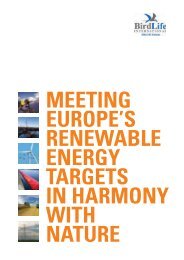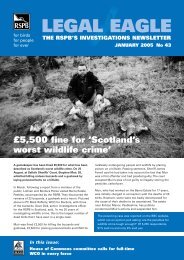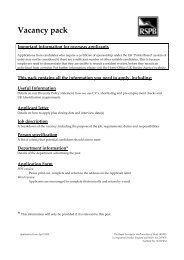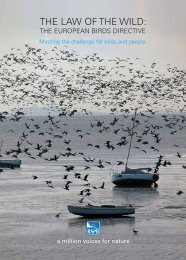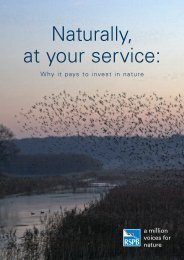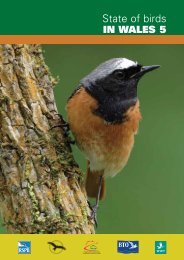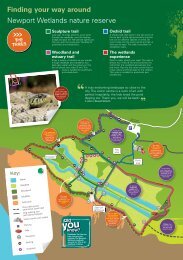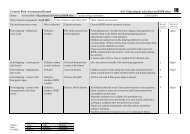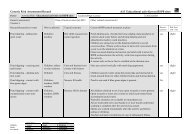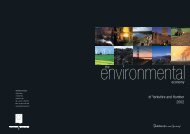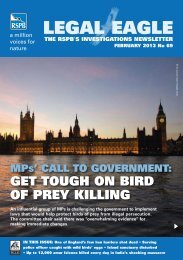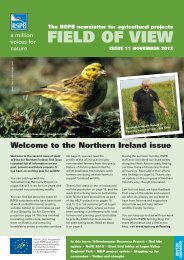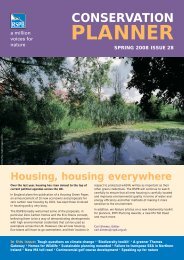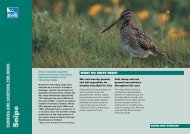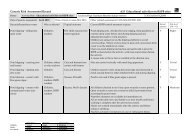annual report and accounts 2012 - RSPB
annual report and accounts 2012 - RSPB
annual report and accounts 2012 - RSPB
Create successful ePaper yourself
Turn your PDF publications into a flip-book with our unique Google optimized e-Paper software.
<strong>RSPB</strong> trustees’ <strong>report</strong> <strong>and</strong> <strong>accounts</strong> 2011-12<br />
Trustees’ <strong>report</strong><br />
Financial review<br />
The <strong>accounts</strong>, which form part of this <strong>report</strong>, comply<br />
with the requirements of the Accounting <strong>and</strong><br />
Reporting by Charities: Statement of Recommended<br />
Practice 2005 (SORP). The trustees consider that in<br />
preparing these <strong>accounts</strong>, they have consistently<br />
applied appropriate accounting policies supported<br />
by reasonable <strong>and</strong> prudent judgements <strong>and</strong> estimates<br />
where required.<br />
A resolution to re-appoint the firm Crowe Clark<br />
Whitehill LLP as auditors to the organisation was<br />
passed at the Annual General Meeting on 8 October<br />
2011.<br />
Financial reserves policy<br />
The <strong>RSPB</strong> holds financial reserves to be applied to<br />
future activities in a number of categories:<br />
• Unrestricted – available to be applied, at the<br />
discretion of the trustees, to any of the <strong>RSPB</strong>’s<br />
charitable purposes<br />
• Restricted – to be applied to the specific<br />
purpose(s) intended by the donor<br />
• Endowment – Endowment funds are restricted<br />
funds that are to be retained for the benefit of<br />
the Charity as a capital fund. Permanent<br />
endowments require the capital to be<br />
maintained <strong>and</strong> only the income <strong>and</strong> capital<br />
growth can be utilised. With expendable<br />
endowments the capital may also be utilised.<br />
Each year the trustees consider the appropriate<br />
level of free reserves. They review the <strong>RSPB</strong>’s<br />
requirements <strong>and</strong> consider a sustained fall in<br />
income of 10–15% to be a reasonable basis for<br />
setting a minimum level. It is the intention of the<br />
trustees to hold sufficient reserves to enable<br />
expenditure to be reduced in a managed fashion,<br />
should the need arise, avoiding the need to halt<br />
work abruptly. The trustees have agreed that free<br />
reserves should normally be within a range of 8–16<br />
weeks of expenditure.<br />
The trustees have fully adopted Financial Reporting<br />
St<strong>and</strong>ard 17 “Retirement Benefits”. The scheme<br />
liabilities are measured at a point in time for the<br />
purposes of FRS 17 but will not crystallise for some<br />
years. Showing the liability in the <strong>accounts</strong> does not<br />
imply a significant constraint over the use of reserves<br />
for the foreseeable future.<br />
The <strong>RSPB</strong>’s primary investment objective is to maintain<br />
the real value of its investments. However, as a<br />
proportion of the financial reserves are likely to be held<br />
in the longer term it is appropriate to invest<br />
conservatively a proportion of the funds to generate<br />
income <strong>and</strong>/or real growth.<br />
Investment properties arising from legacies are managed<br />
by the <strong>RSPB</strong> until disposal.<br />
In managing investments, wherever possible, we follow<br />
the principles of Socially Responsible Investing (SRI).<br />
These principles are to:<br />
• invest in companies that make a positive<br />
contribution to society<br />
• use influence as an investor to encourage best<br />
practice management of social responsibility issues<br />
• avoid investing in companies whose activities<br />
conflict strongly with <strong>RSPB</strong> objectives.<br />
The trustees rely upon specialist advisers for fund<br />
selection <strong>and</strong> allocation. Investment performance is<br />
compared to an independent benchmark <strong>and</strong> the<br />
target for investment returns is to outperform this<br />
benchmark by at least 1% per annum over a rolling<br />
three-year period.<br />
The Charity investment of £3,250,000 in <strong>RSPB</strong> Sales<br />
Limited, a wholly owned subsidiary, is held at cost<br />
<strong>and</strong> represents the aggregate amount of the<br />
subsidiary’s assets, liabilities <strong>and</strong> funds. <strong>RSPB</strong> Sales<br />
Limited Gift Aided its entire profit of £5,115,000 to the<br />
Charity. The trustees consider this a satisfactory return<br />
on their investment.<br />
On 29 February 2008, the Charity purchased March<br />
Farmers (Washl<strong>and</strong>) Limited in order to acquire the<br />
leasehold interest in l<strong>and</strong> in the Nene Washes. The<br />
Charity investment of £551,000 in March Farmers<br />
(Washl<strong>and</strong>) Limited, a wholly owned subsidiary, is<br />
held at cost <strong>and</strong> represents the aggregate amount of<br />
the subsidiary’s assets, liabilities <strong>and</strong> funds. March<br />
Farmers (Washl<strong>and</strong>) Limited Gift Aided its entire<br />
profit of £37,000 to the Charity.<br />
Farming For Nature, a company limited by guarantee,<br />
was incorporated in 2011. The intention is to use this<br />
entity in relation to l<strong>and</strong> leased from United Utilities at<br />
Haweswater in Cumbria.<br />
Investment policy <strong>and</strong> powers<br />
<strong>RSPB</strong> investment powers are as set out in the<br />
Society’s governing documents, the Charter<br />
<strong>and</strong> Statutes, <strong>and</strong> are wider than those<br />
contained in the Trustees Investment Act<br />
2000.<br />
www.rspb.org.uk 17



